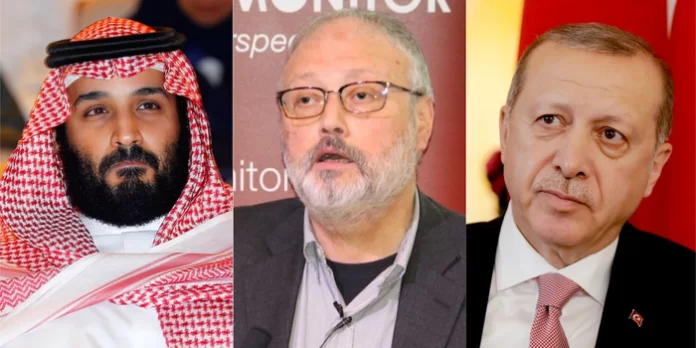Saudi Arabia’s mixed signals over the normalization issue suggest that MBS has not fully forgotten the role Turkey played in the aftermath of Khashoggi’s assassination, when Turkish officials suggested that the crown prince had masterminded the murder.
Saudi crown prince Mohammed bin Salman is scheduled to arrive in Ankara on Wednesday, making his first visit to Turkey following the slaying of Saudi columnist Jamal Khashoggi in Istanbul. Simon Mabon, lecturer in Middle East studies in United-Kingdom gives his analysis.
It was earlier reported that, since the beginning of 2020, the Middle East has experienced a broad detente and a general reconciliation between erstwhile rivals. The most recent example of this trend has been the rapprochement between Turkey and Saudi Arabia; Saudi Crown Prince Mohammed bin Salman’s visit to Ankara on June 22, 2022, came nearly two months after Turkish President Tayyip Erdogan’s goodwill visit to Riyadh in April. While Erdogan’s visit was regarded as a step towards normalizing ties between the two countries, it was bin Salman’s visit which underscored a mutual desire for better relations and suggested an imminent return to full normalization.
Turkey and Saudi Arabia’s relations have deteriorated since the beginning of the Arab Spring protests, as the two parties pursued opposing interests—particularly in Egypt, where Turkey embraced Muslim Brotherhood-affiliated president Mohamed Morsi, while Saudi Arabia backed the Egyptian army that overthrew him. Turkish-Saudi relations worsened with Turkey’s full-throated support of Qatar during the four-year-long Gulf diplomatic crisis, in which the small peninsular emirate faced a land, sea, and air blockade by Saudi Arabia, the United Arab Emirates, Bahrain, and Egypt.
It was during this period that Qatar invited Turkey to establish a base in its territory—the first military base of its kind in the Gulf. Relations between the two countries reached their nadir following the assassination of Washington Post columnist Jamal Khashoggi in Istanbul in 2018 and the subsequent role of Turkey in forcing Riyadh to admit that the murder had taken place within the Saudi consulate, though Saudi leaders maintained that the killing had been a rogue operation undertaken without the knowledge or approval of the crown prince.
Discursive Normalization
Turkey and Saudi Arabia have been quietly negotiating normalizing relations for more than a year, following the end of the Qatari diplomatic crisis in January 2021. Despite a year-long negotiation process, Saudi diplomats sent mixed messages to their Turkish counterparts.
Turkish President Erdogan’s visit to Saudi Arabia in April 2022 was framed as a goodwill visit, Turkish officials agreed to transfer the Khashoggi case to Saudi jurisprudence—a move for which Turkey was roundly criticized by human rights organizations. Despite Ankara’s positive gesture, Riyadh rewarded Turkey’s overture by imposing a travel ban on the country in May, citing increasing Covid-19 infections in Turkey.
Although the ban was lifted a week before Mohammed bin Salman visited Turkey on June 22, Saudi Arabia still maintains an unofficial boycott of Turkish goods and has discouraged its citizens from visiting Turkey as can be understood from May 2022 Turkish export figures. The Kingdom is expected to lift these measures in the coming days and encourage enhancement of bilateral relations in political, economic, military, and security issues, according to joint statement signed after the meeting.
Saudi Arabia’s mixed signals over the normalization issue suggest that MBS has not fully forgotten the role Turkey played in the aftermath of Khashoggi’s assassination, when Turkish officials suggested that the crown prince had masterminded the murder. The supposedly rogue operation conducted in Istanbul made world headlines and remains definitive of the Western public’s imagination of the Saudi crown prince.
MBS and his inner circle blame Turkey for their role in leaking damaging information, including video and audio footage of the murder, to Western intelligence agencies. Turkey’s actions at the time were partly motivated by MBS’s depreciatory attitude towards Turkey, reflected in Riyadh’s unfriendly policies toward Ankara.
US’ Biden Confronts Saudi Crown Prince Over Khashoggi Murder, Expects Action on Energy
In the United States, President Donald Trump continued to support MBS, leading the crown prince to dismiss the potential repercussions of the murder. After the gruesome recordings were released, however, the global shock and anger that erupted as a result of the incident appear to have caught MBS off-guard and cost the kingdom many of its prospective financial links with the Western world.
Economic Pressure
Turkey’s ongoing financial woes have led many analysts to suggest that Turkey’s attempts to reconcile with the Kingdom are primarily motivated by economic considerations. However, such a claim underestimates the conciliatory fervor that has gripped the region and Turkey in general—including, for instance, normalization between Turkey and Armenia, a nation with insignificant economic power.
While these observers underestimate Turkey’s new foreign policy, they also overestimate Saudi Arabia’s small impact on the Turkish economy. According to Bakir and Ersoy, Saudi economic activities are not central to any aspect of Turkey’s international trade, including trade volume, foreign direct investment, and tourism.
At its peak, the bilateral trade volume between Turkey and Saudi Arabia reached $5.8 billion, or 1.5% of Turkish international trade exchanges. Following Riyadh’s unofficial boycott during the Gulf diplomatic crisis, these figures fell to $3.5 billion in 2021.
Foreign direct investment flows between the two countries have also remained modest, amounting to $1.3 billion at its peak in 2008—a number that was still only around 1 percent of Turkey’s total FDI between 2005 and 2021. In its peak period, Turkey welcomed 750,000 Saudis to Turkey in 2018, a number that constituted no more than 2 percent of tourists visiting Turkey.
Despite meager economic ties between the two countries, Mohammed bin Salman has wrongly supposed that capital from the Gulf is the only option available to Ankara to buoy Turkey’s weak economy. As such, the crown prince has sought to pressure Ankara by postponing normalization and withholding Saudi investment.
However, this policy is misguided; although Turkey’s financial situation has shown little sign of improvement, it has undergone normalization with other powers, including the very wealthy United Arab Emirates, Saudi Arabia’s traditional ally. MBS’s visit to Turkey suggests that Saudi officials now understand that any postponement could punish Riyadh as much as Ankara.
READ ALSO: US-Saudi ties: Biden meets with Saudi’s MBS, raises killing of journalist Khashoggi
Global and regional politics have also played a role in the visit. Iran and Saudi Arabia have always framed themselves as regional rivals. Iran’s use of its proxies against Turkey, especially in Iraq, provides Saudi Arabia with a unique opportunity to gain a regional partner. Regional instability has also increased following Russia’s invasion of Ukraine in late February, which alarmed the regional powers.
Moreover, Turkey’s increased role in the region, particularly in Syria and Iraq, have given Turkey newfound influence in regional affairs. The fame of Turkish-made Bayraktar drones and the fearsome reputation they have gained in Ukraine have led Saudi officials to express interest in buying them—potentially as a way to break the deadlock in its stalemated war in Yemen.
Warm Welcome
While the Saudi government is clearly not as eager as its Turkish counterpart to warm bilateral ties, Erdogan took a risky step by warmly welcoming the crown prince to Ankara, just as he did to UAE’s then-Crown Prince Mohammed bin Zayed. Erdogan’s warm welcome for MBS was criticized, as some in the Turkish public labeled Ankara’s about-face in policy as economically motivated.
The current visit by the crown prince, however, seems to be a concrete step by Riyadh to broaden its relations in the region. The visit was a part of a broader regional goodwill tour that originally included Egypt, Greece, and Cyprus.
It is also important to note that MBS’s visit to Ankara comes soon before President Joe Biden’s planned visit to Riyadh. The Saudi leader may have judged that reconciliation with Turkey will strengthen his hand in his dealings with Washington.
Biden’s relations with both Erdogan and bin Salman are less than ideal, to say the least, due in large part to his pre-election promises to scale back U.S. involvement in the Middle East and his critical statements about both leaders. MBS is keenly aware that Biden’s visit is motivated by the global economic crisis that began with Covid-19 and has deepened in the wake of the Russian invasion of Ukraine. Amid a hike in oil and gas prices, Biden aims to stabilize the global economy
Of course, the question remains whether the U.S. president will be able to gloss over the Khashoggi murder in exchange for economic assurances from Saudi Arabia—a trade-off that other Western leaders, including French President Emmanuel Macron and British Prime Minister Boris Johnson, have been accused of taking. If everything goes as stated by both countries, Turkey and Saudi Arabia will probably close the Khashoggi case and commit to restoring the pre-crisis relations.













